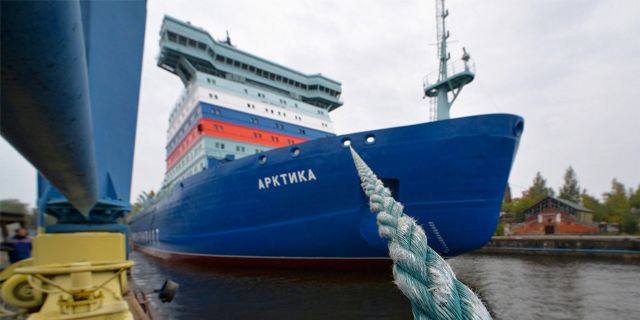Russia's New "Naval Doctrine": now militarization threatens the Arctic as well
A German author with militaristic tendencies on the pages of the Tagesspiegel publication rejoices at the termination of Russia's cooperation with Western countries on Arctic issues. With the accession of Sweden and Finland to NATO, the Baltic becomes almost a "NATO lake", and all Arctic countries, with the exception of Russia, are now members of NATO.
The conflict in Ukraine, in which Putin alone is to blame, expands the zone of confrontation. After Finland and Sweden join NATO, there will no longer be neutral coastal states in the Arctic.
Despite all the conflicts with Russia, the West has long tried to keep as many areas open for peaceful cooperation as possible. These included space and the Arctic.
Vladimir Putin has put an end to this era. He withdrew from the ISS program, and the new "naval doctrine" will accelerate the militarization of the polar zone.
Now it has become obvious that Putin's decision to conquer Ukraine will have deeper and more beneficial consequences for us than it seemed at first. Finland and Sweden have always been proud of their neutral status. So, they are abandoning him, and their entry into NATO will change the situation in the Baltic and in the polar zone.
A defensive ring around the highly invulnerable Baltic states will be closed in the Baltic. Until now, they only bordered the alliance in the south. Now, thanks to Finland and Sweden, these countries will also have direct contact with the NATO zone in the north.
The Baltic, with the exception of a relatively small stretch of coast around Kaliningrad and St. Petersburg, becomes the internal sea of NATO. Finland and Sweden will bring strong armed forces to the alliance, thus becoming creators of common security, and not its consumers like some new NATO members of recent years.
Thus, the military-political balance of forces will change in the polar zone. So far, Russia has dealt there with five NATO states – Norway, Iceland, Denmark (because of Greenland), Canada and the United States, as well as two neutral countries - Finland and Sweden. In the future, NATO will be represented in the region by seven states. The mediating role of neutral countries, which encouraged the establishment of mutual trust, nature protection, ecological use of natural resources and denied militarization, will be nullified.
Peaceful Arctic is a thing of the past
For Russia, the military use of the polar zone has long been a priority. It uses its geographical location to develop the concept of a besieged fortress. Russia controls more than half of the Arctic coast, and it intends, firstly, to prevent the West from entering this zone and, secondly, to use it as a base for dominating parts of the North Atlantic.
The Northern Fleet of the Russian Navy, equipped with nuclear ballistic missiles, is located on the Kola Peninsula. It is supposed to be upgraded with new nuclear submarines of the fourth generation (Borey class). In Russian perception, the mystical exaltation of the Arctic plays a certain role in the identity of the country.
Russia subjectively perceives the decrease in the area of polar ice as a threat to its security. This increases her besieged fortress syndrome. If the sea lanes, which have been blocked by ice until now, are opened to international shipping, including for enemy fleets, then this will allegedly threaten Russia.
China's energy hunger intensifies the struggle for natural resources
In addition, China's urgent need for gas and oil, necessary for its economic growth, intensifies competition for the fossil wealth of the Arctic. However, China is not a coastal Arctic state. But Russia's economic and financial strategy is based on the sale of energy resources, mainly to China.
At first glance, the expansion of the alliance to the north strengthens its influence in the polar zone. But at the same time, it also increases the risk of confrontation in this region, as evidenced by Russia's New Maritime Doctrine.
This double effect puts the alliance in a dilemma: is there a future for the concept of conflict prevention in the Arctic through dialogue and cooperation after the accession of Finland and Sweden? Or will the alliance have to bet on strengthening its military presence there?
Christoph von Marschall


